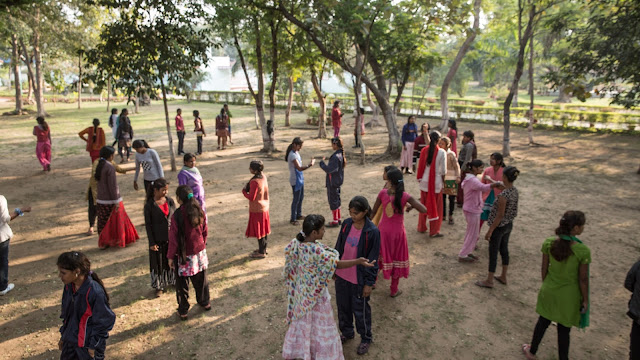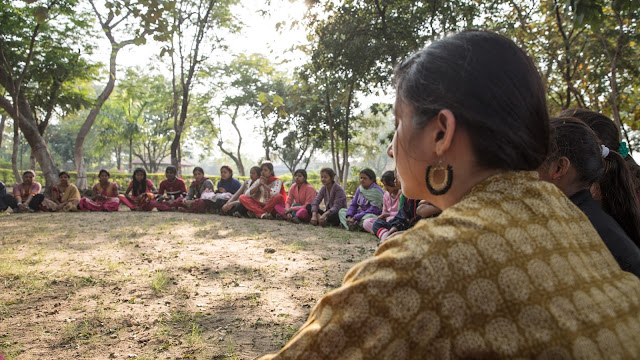The year started with meeting some amazing young women from Jharkhand at the SELF (Sports, Empowerment, Leadership and Freedom for young girls) workshop organised by CREA. CREA has been working with the community based organisations in Jharkhand for the past three years to advance sexual and reproductive health rights of adolescent and young women through sports. This particular workshop was a 15 day residential workshop for 50 tribal girls selected from across the state. This residential workshop will happen everywhere henceforth, providing a world of new exposures, learning and experiences to girls.
The fifty fiery and fun loving girls came from different villages and cities across Jharkhand to attend this workshop at the tribal cultural centre in Jamshedpur. Some of them took overnight buses, some of them came in trains, some in shared jeeps and mini buses to attend the workshop, forgoing their Christmas and New Year celebrations with the families back home. Like one of the girls said to me, "I celebrate with mummy and papa every year, but I wouldn't get an opportunity to come here and be with all the other girls and the teachers and learn so much, so I don't mind skipping Christmas and New Year outings with the family."
The girls came from different parts of the state, but the ideas of the workshop, their mentors and teachers, the love for football and sports and learning new things together really brought out the team spirit in them.
My two day workshop with them centered around the ideas of the Why loiter? book and the movement. The medium I chose to share these ideas with them was theatre. The girls had never attended a theatre or drama based workshop before so they were excited and full of energy. We started with some basic theatre games and exercises and then moved to creating short improvisations based on their experiences and memories of public spaces, what it means to be a girl in their city/village, what the familial and societal norms of clothing, access to public spaces and mingling with people of other genders.
At first most of them said that they get a lot of freedom and can do whatever they like, barring a few who said that they feel restricted in terms of their clothing and freedom.
But when I probed a little more, I realized that the conditioning had been so deep and strong that the girls had internalised it and felt whatever they were offered was good enough. For example, most of them said they could wear whatever they liked, but it actually meant they could wear any design/colour/style of salwaar kameez only. When they shared further, they revealed that they were not allowed to wear jeans or t shirts or dresses at all.
Same case with accessing public spaces, most of them said that they could go anywhere they felt like, but soon it was revealed that this freedom was only till 4 or 5 in the evening and was restricted to going to school, to the tuition class or a friend's house in the neighbourhood. After 4 in the evening they were not allowed to step out at all, unless they were escorted by a brother, or if the entire family was going out.
When it came to communicating or being friendly with boys, the experiences were very similar. There was a lot of shaming and teasing if the girls spoke with boys, even with their classmates or friends' brothers. Rumours and 'link ups' would immediately be created if the neighbours or people from the extended families saw the girls with boys. This led to the girls and boys leading completely segregated lives and meeting only secretly.
During the improvisations and creating short dramatic pieces based on their experiences some very interesting stories came forth.
One girl narrated her story of wanting to buy jeans. She forced her mother to buy her a pair of jeans, inspite of her mother repeatedly saying no to her. Finally, when she wore the pair of jeans and went out, her aunt who lived close by teased and ridiculed her for wearing jeans, something that only girls that are 'immoral' wear. This hurt her so much that she came home, took off the pair of jeans and wore salwar kameez. When her mother found out she scolded her for making her buy such expensive jeans and then not wearing them. This double jeopardy caused so much stress to the girl that she took a pair of scissors and cut up her brand new pair of jeans into ribbons.
Another story was shared by a girl who lives in Hazaribagh. She said that once she was sitting in her classroom and a couple of her brother's friends came to the window and began talking to her. During this her pencil fell out of the window and one of the boys picked it up and gave it back to her. This simple act caused such a furor in the community that when she reached home she was thrashed by her mother and locked up at home for a few days.
Some of the participants were married. It was even tougher for them to access public spaces and have platonic relationships with the opposite sex. Most of them said that it was only because of the support of their immediate families and the constant convincing by CREA teachers that they were able to come for the workshop.
That evening when I spoke to them about 'Why loiter?' the book and the ideas it talks about, they heard me in pin drop silence and when I told them about the movement that is inspired by the book they were thrilled. I narrated to them our several run ins with the police, with harrassers on the roads, with stalkers and people in general that find it odd for us to roam around at night or sleep in a public park or cycle around the city. They clapped and laughed and were spellbound with the photographs of the why loiter sessions I showed them.
There wasnt anyone in the room that disagreed with the idea, or said it was risky or impractical or not worth their while. I got a sense that this group, more than any other group I have worked with, understood and appreciated the value of unconditional freedom and what that means in an individual's life.
One of their mentors who has been a CREA beneficiary shared a beautiful story. She said that in her small town, she and a few other women go for morning walks to remain fit. All of them would cut the route short and head home because they had to make tea for their husbands and families. One day they discussed that why is it that they have to cut short their morning walks and rush home to make tea, instead of being served tea once in a while by their husbands. Since that day they decided to stop at a chai tapri and drink chai on the streets and not bother about reaching home in time to serve tea. Their families soon followed the decision and began making their own tea, not expecting the wife/mother/daughter in law to make it.
Some of the girls got so inspired by our midnight loitering sessions that they insisted their mentors to let them roam around outside in the night that very day, and calmed down only when they were promised an outing the very next day.
The next day the girls shared their own practice of loitering that had already started to take shape. Some of them had lay down on the grass in the lawns of the Tribal Cultural Center after lunch. When a few of the male instructors walked by one of the girls whispered to the others to get up and sit in a more 'ladylike' manner. To which, the others said, 'Why? We are just lying down and enjoying the Sun. When men can do it without feeling embarrassed, why shouldn't we?' after which the girl that had spoken also lay down and they kept enjoying the Sun on the winter afternoon without caring about looking 'decent'.
That day the girls made four short skits based on the themes of gender, public space and freedom. They spoke about freedom of clothing, roaming around freely, riding cycles, exploring new spaces, being out with friends for pleasure, the restrictions put on them by the families and society at large and their little revolts against it.
At the end of the session they had all become familiar with the word 'loitering' and the power it entails. They promised me that they would now question the norms that they have thus far followed without ever questioning, and would make sure they explore the public spaces in and around their villages and towns and negotiate with their families over norms of clothing and mingling with boys.












I am an architect and independent researcher. On 22nd Feb 2025 I will be delivering a keynote address in Ahmedabad to the Feminist Collective in Architecture. After that event I would like to publish the text of my talk on my blog and would like to use a picture from this blog post. It is the image just above the line "That evening I spoke to them about 'Why Loiter?'...." and I like it as it shows women asserting their presence with joy in a public space. Please let me know if I may use this picture and if so what the credit should say.
ReplyDelete